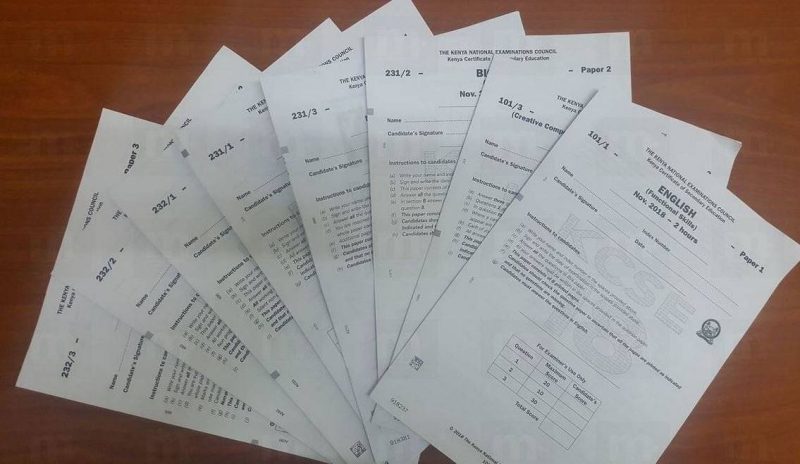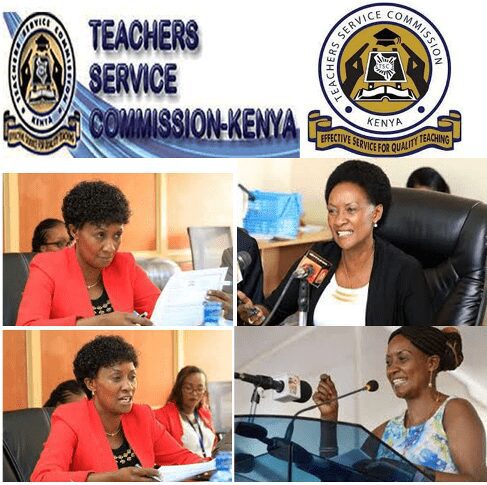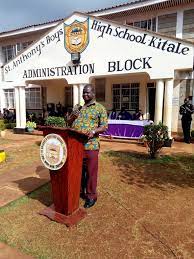NAME………………………………………..ADM NO…………………….
CLASS………………………………………..DATE………………………….
TIME: 2HRS 30 MINS
HISTORY & GOVERNMENT-311/1
FORM THREE TERM 3
JOINT EXAMINATION
Instructions
- Write your name and admission number in the spaces provided above
- Write your name, ADM no, class and date of the examination in the spaces provided above.
- Check if all the pages are printed
- Answer all the questions on the spaces provided.
- Answer all the questions in English.
| QUESTION | 1-17 | 18 | 19 | 20 | 21 | 22 | 23 | 24 | 25 | TOTAL |
| SCORE |
Read and download more free history resources below; Educationnewshub.co.ke:
History Paper 1 Topic By Topic Questions And Answers
HISTORY NOTES FORM 2: NEW SYLLABUS SIMPLIFIED NOTES
HISTORY NOTES FORM 3: NEW SYLLABUS SIMPLIFIED NOTES
History & Government notes and exams for forms 1, 2, 3 and 4 free downloads
HISTORY NOTES FORM 4: NEW SYLLABUS SIMPLIFIED NOTES
HISTORY NOTES FORM ONE: NEW SYLLABUS SIMPLIFIED NOTES
HISTORY NOTES FORM 1-4: COMPLETE HISTORY NOTES
History Paper 2 Topic By Topic Questions And Answers (All Topics)
History and Government free lesson plans for all topics (Form one to four)

SECTION A (25MARKS)
Answer ALL questions in section A
- Name any one branch of History (1mk)
- Define genetics (1mk)
- Give one Southern Cushitic speakers that migrated into Kenya during the Pre-colonial period (1mk)
- Identify two ways through which one can become a Kenyan citizen (2mks)
- State one way in which National Integration is important (1mk)
- List one community in East Africa that participated in long distance trade in the 19th Century (1mk)
- Name ONE sources of information on the East African coast up to 7th century (1mk)
- Highlight two factors for the growth of the coastal city states (2mks)
- Identify two types of democracy (2mks)
- Mention any two Rights of an arrested person (2mks)
- Identify two methods used by the British to establish colonial rule in Kenya (2mks)
- Give two functions of the Oloibon among the Maasai during the pre-colonial period (2mks)
- Identify one treaty that was signed between the British and the Germany in the scramble and partition of East Africa (1mk)
- State one economic reason why the British colonized Kenya in the 19th Century (1mk)
- State two main crops that were cultivated by the white settlers during the colonial period in Kenya (2mks)
- Highlight two terms of the Devonshire white paper of 1923 (2mks)
- Identify the leader who stepped down as the president of Kenya African Union for Jomo Kenyatta (1mk)
SECTION B (45MARKS)
Answer any three questions each questions carries 15marks
- a) Mention five Eastern Bantu communities which settled in Kenya during the pre-colonial period (5mks)
- b) Describe the economic organization of the Maasai during the pre-colonial period (10mks)
- a) State five characteristics of the coastal city states after 1500AD (5mks)
- b) Explain five effects of missionary work on Africans in Kenya (10mks)
- a) Identify five problems experienced by the imperial British East African Company to establish colonial rule in Kenya (5mks)
- b) Discuss five results of the Nandi resistance against the British occupation in Kenya (10mks)
- a) Highlight five problems encountered by the railway builders during the construction of the Kenya-Uganda railway (5mks)
- b) Explain five problems faced by MauMau fighters during the struggle for independence in Kenya (10mks)
SECTION C (30MARKS)
Answer any three questions
- a) State three values of a good citizen (3mks)
- b) Explain six factors which promote National Unity in Kenya (12mks)
- a) Mention any three characteristics of a good constitution (3mks)
- b) Discuss six peaceful methods of conflict resolution (12mks)
- a) Name the three arms of the National Government in Kenya (3mks)
- b) Explain six functions of the Independent Electoral and Boundaries Commission (IEBC) (12mks)
______________________________________________________________________
NAME………………………………………..ADM NO…………………….
CLASS………………………………………..DATE………………………….
TIME: 2HRS 30 MINS
HISTORY & GOVERNMENT- 311/2
FORMTHREE TERM 3
JOINT EXAMINATION
Instructions
- Write your name and admission number in the spaces provided above
- Write your name, ADM no, class and date of the examination in the spaces provided above.
- Check if all the pages are printed
- Answer all the questions on the spaces provided.
- Answer all the questions in English.
For Examiners use only
| Section | Questions | Marks |
| A | 1 -17 | |
| B | 18 | |
| 19 | ||
| 20 | ||
| 21 | ||
| C | 22 | |
| 23 | ||
| 24 | ||
| TOTAL |
SECTION A [25mks]
(ANSWER ALL QUESTIONS)
- Mention one method of dating fossils. [1mks]
- State two stages of human evolution according to Charles Darwin. [2mks]
- Name the tools made by early man during the Middle Stone Age period. [1mk]
- State two theories that explain the origin of agriculture. [2mks]
- Identify the main item of trade from west Africa during Trans-Saharan trade. [1mk]
- Give one example of international trade. [1mk]
- State two advantages of human transport. [2mks]
- Name two types of print media. [2mks]
- Give the contribution of Alexander Graham Bell in the field of industry. [1mk]
- Give two reasons why Japan emerged as an industrial power. [2mks]
- Give one factor for the decline of Meroe. [1mk]
- State one result of the invention of the wheel in Mesopotamia. [1mk]
- Give one economic reason that made European countries to scramble for colonies in Africa. [1mk]
- State two reasons why indirect rule was unsuccessful in Southern Nigeria. [2mks]
- Give two colonial systems of administration. [2mks]
- State two results of the Ndebele war with the British in 1893. [2mks]
- List two problems encountered by nationalists in South Africa. [2mks]
SECTION B [45 MKS]
(ANSWER ANY THREE QUESTIONS FROM THIS SECTION)
- a)Identify three ways in which early man used stone tools. [3mks]
b)Describe the way of life of early man during the late Stone Age period. [12mks]
- a)Identify three reasons why African slaves were preferred by Europeans during Trans-Atlantic trade. [3mks]
b)Explain SIX factors that led to the decline of Trans- Atlantic trade. [12mks]
- a)Mention five economic activities carried out by Buganda community in the 19th [5mks]
b)Explain five factors that led to the growth of the Shona kingdom in the 19th C. [10mks]
- a)State three roles of Kwame Nkrumah in the struggle for independence in Ghana. [3mks]
b)Explain six challenges faced by FRELIMO in the struggle for independence in Mozambique. [12mks]
SECTION C [30MKS]
(ANSWER ANY TWO QUESTIONS)
- a)Outline the structure of the French system of administration in West Africa.[5mks]
b)Explain five effects of the British rule in Zimbabwe. [10mks]
- a)State three duties of Emirs in North Nigeria during colonial period. [3mks]
b)Explain six causes of the maji maji rebellion. [12mks]
- a)State five terms of Berlin conference of 1884- 1885. [5mks]
- b) Explain five reasons why Samori was defeated by the French. [10 mks]
_____________________________________________________________
HISTORY AND GOVERNMENT
PAPER 2
TERM THREE
MARKING SCHEME
SECTION A [25mks] ANSWER ALL QUESTIONS.
- Mention one method of dating fossils. [1mks]
- Geological periods
- Fission track dating
- Statistical dating
- Stratigraphy
- Chemical dating
- Lexico-statistics dating
- State two stages of human evolution according to Charles Darwin. [2mks]
- Aegyptopithecus
- Dryopithecus/Proconsul
- Ramapithecus /Kenyapithecus
- Australopithecus/Zinjanthropus
- Homo habilis
- Homo erectus
- Homo sapiens
- Homo sapiens sapiens
- Name the tools made by early man during the Middle Stone Age period. [1mk]
- Sangoan tools i.e scrappers, chisel picks, plane picks, daggers, choppers, spears
- State two theories that explain the origin of agriculture. [2mks]
- Diffusion theory
- Independent theory.
- Identify the main item of trade from West Africa during Trans-Saharan trade. [1mk]
- Gold
- Give one example of international trade. [1mk]
- Trans – Atlantic trade/ Indian ocean trade
- State two advantages of human transport. [2mks]
- It was readily available
- It was a cheap method
- It was flexible
- Was convenient
- Accidents were rare.
- Name two types of print media. [2mks]
- News papers
- Magazines
- Journals [periodicals]
- Books
- News letter
- Give the contribution of Alexander Graham Bell in the field of industry. [1mk]
- Invented telephone
- Give two reasons why Japan emerged as an industrial power. [2mks]
- Government reforms
- Energy resources
- Natural resources
- Political stability
- Large-domestic market
- Education & research
- Capital
- Large population that provided market and labour. [Any other]
- Give one factor for the decline of Meroe. [1mk]
- Exhaustion of minerals
- Exhaustion of forests
- Attack by the Axum kingdom
- Stiff competition from neighbouring kingdom.
- State one result of the invention of the wheel in Mesopotamia. [1mk]
- Was used to move war chariots
- Helped in carrying agricultural produce
- Led to the development of roads.
- Used in making of pots
- Give one economic reason that made European countries to scramble for colonies in Africa. [1mk]
- Need for cheap raw materials
- Readily market
- Need for cheap labour
- Need to invest their surplus capital
- Speculations that Africa had plenty of minerals.
- State two reasons why indirect rule was unsuccessful in Southern Nigeria. [2mks]
- There was linguistic disunity.
- People in S. Nigeria were opposed to forced labour, taxation and oppression.
- The educated elite resented the rule by uneducated traditional chiefs
- The southern people had cultural division. [any 2]
- Give two colonial systems of administration [2mks]
- Direct rule
- Indirect rule
- Assimilation policy
- Association
- State two results of the Ndebele war with the British in 1893. [2mks]
- Ndebele were pushed to the reserves
- Subjected to forced labour
- Subjected to taxation
- Cattle were confiscated
- Loss of lives.
- Loss of independence [any 2]
- List two problems encountered by nationalists in South Africa. [2mks]
- Nationalists were killed.
- Nationalist were harassed by security agents.
- Many people fled to other countries.
- Trade unionists were intimidated.
- Use of pass law curtailed movement of the nationalists.
SECTION B [45 MKS]
ANSWER ANY THREE QUESTIONS FROM THIS SECTION.
- Identify three ways in which early man used stone tools. [3mks]
- To hunt
- To scrap animal skin
- Sharpening
- Digging roots
- Skinning animals
- Describe the way of life of early man during the late Stone Age period. [12mks]
- Made simple tools called microliths
- Wore clothes from animal skins
- Made shelter from tree branches and grass
- Painted animals he hunted.
- Decorated the body with red ochre
- Communicated using spoken language
- Started to grow crops and keeping livestock
- Buried the dead -religion
- Development of trade
- Development of government
- Settled life
- Identify three reasons why African slaves were preferred by Europeans during Trans-Atlantic trade. [3mks]
- They were stronger
- They were immune to diseases
- They were readily available,
- They were cheaper to acquire
- They were easily identified because of the skin colour.
[mark any other correct]
- Explain SIX factors that led to the decline of Trans- Atlantic trade. [12mks]
- Humanitarian groups opposed slave trade.
- American independence of 1776.
- Development of legitimate trade
- Role of economists
- Development of machinery
- French revolution of 1789
- Closure of American slave market
- Christian revival movements.[mark any other correct]
- Mention five economic activities carried out by Buganda community in the 19th [5mks]
- Growing crops
- Hunting and gathering
- Trading
- Livestock keeping
- Fishing
- Pottery and basketry
- Boat making and canoes
- Cloth making from tree barks
- Explain five factors that led to the growth of the Shona kingdom in the 19th [10mks]
- Good and able leaders e.g Chikura
- Participated in trade and therefore acquired a lot of wealth.
- Strong army for defending the community
- Farming – Availability of food
- Religion- Based on Mwari cult
- Mineral resources – gold, copper
- Centralisation enhancing political order.
- State three roles of Kwame Nkrumah in the struggle for independence in Ghana. [3mks]
- Formed political party Convention Peoples Party.
- United Africans in the struggle for independence
- Started a newspaper where African grievances were published.
- Held political rallies to sensitise africans
- Explain six challenges faced by Front for the liberation movement of Mozambique(FRELIMO) in the struggle for independence in Mozambique. [12mks]
- Ideological differences among leaders
- Competition from other guerrilla movements e.g COREMO
- Shortage of basic needs
- Assassination of their leader Edwardo Mondlane that demoralised them
- Use of cruel and ruthless method by the Portuguese to suppress it
- It was termed as a terrorist movement by the church.
SECTION C [30MKS]
ANSWER ANY TWO QUESTIONS.
- Outline the structure of the French system of administration in West Africa.[5mks]
- Minister for colonies based in France
- Governor in charge of colonies [Lieutenant]
- Commandant de Cercle [ Province ]
- Chef de sub division [District]
- Chef de canton [location]
- Chef de village [village]
- Explain five effects of the British rule in Zimbabwe. [10mks]
- Africans were displaced from their land
- Africans were subjected to poverty and suffering
- Africans were pushed into reserves
- African chiefs lost their authority and power over their subjects
- Africans chiefs betrayed their fellow Africans i.e acted as puppets of the British
- Africans were subjected to heavy taxation
- African traditional economy was undermined
- Introduction to Christianity and western education undermined African culture
- Africans were subjected to forced labour
- There was racial segregation
- Infrastructure was improved
- Led to introduction of new crops
- Led to the rise of African nationalism
- State three duties of Emirs in North Nigeria during colonial period. [3mks]
- They collected taxes
- They recruited labourers for public works
- They headed local government
- They tried cases in the local customary courts
- Maintained law and order.
- Appointed village heads
- Communicated colonial policies to the people.
- Supervised construction of roads and markets
- Explain six causes of the maji maji rebellion. [12mks]
- The forced cotton –growing programme
- Taxation
- Forced labour
- Employment of akindas and Jumbes
- Harsh German rule
- Role of religion i.e Kinjekitile Ngwale
- Land alienation
- Desire to revenge by the Ngoni
- Sexual abuse
- Cultural interference
- Desire to regain independence
- State five terms of Berlin conference of 1884- 1885. [5mks]
- Any European power claiming any region in Africa was to inform other European powers interested.
- European powers were to declare their sphere of influence or areas they wished to occupy.
- European power claiming a sphere of influence was required to follow it up with effective occupation
- All European powers were to abolish slave trade
- Congo and Niger were to be left free and open for navigation
- The European powers recognised the demands of king leopard II over Congo free state. [mark any other]
- Explain five reasons why Samori was defeated by the French. [10 mks]
- He did not receive British protection since the British did not want to conflict with French.
- African rulers such as Tieba and Seku whom he came into conflict with supported the French /divide and rule policy by the French
- The non-Muslims Africans supported the French since they were against islam religion
- Samori used the scorched earth policy which was disliked by many people
- Samori lost some of his source of wealth for example the Bure Gold mines
- The non-Mandinka communities did not fully support Samori since he always mistreated them.
- The French had superior weapons compared to the Mandinka
- The French surrounded Samori’s capital at Dabakala forcing him to surrender




